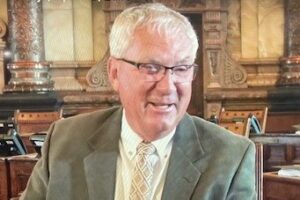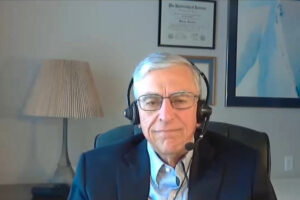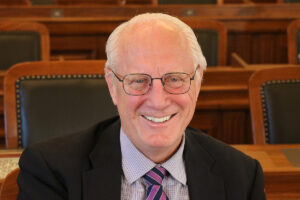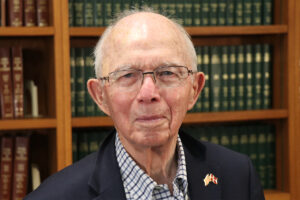Topic: Kansas State University (KSU)

Interview of Lana Oleen, October 14, 2019
Interviewed by Joan Wagnon
Lana Oleen, who represented Riley and Geary counties in the Kansas Senate, discusses her four terms in the Senate (1989-2004). Oleen focuses on the leadership approach she developed working within a closely divided caucus and during periods of divided state government. She cultivated her natural inclination to bring people together to find solutions to constituents’ problems and built upon skills first developed as a classroom teacher to rise through the ranks to become Senate Majority Leader.

Interview of Fred Kerr, April 13, 2018
Interviewed by H. Edward (Ed) Flentje
Fred Kerr reflects on his 15 years in the Kansas Senate representing the 33rd Senate district. He recalls Senate leaders and fellow Senators who helped him as a freshman and whose influence guided him throughout his career. Fred talks about the process involved in securing a leadership position in the Senate and the dynamics of leadership races. He observes how relationships between competitors for leadership offices affected Senators differently and how they worked together in subsequent legislative sessions. He also reflects on how decisions were made regarding tax policy both to fund highways and public schools. Show MoreFred, who ran for Governor in 1994, comments about the increasing influence of money and monied interests in state-wide politics. A previous oral history interview of Fred Kerr is here. Show Less

Interview of Robert (Bob) Miller, November 9, 2017
Interviewed by H. Edward (Ed) Flentje
Former Speaker of the Kansas House of Representatives, Robert (Bob) Miller recalls his many years of service to the State. He describes his involvement with the Young Republicans at K-State, his first campaign to represent his area of Sumner County, and moving up through the ranks in the House despite not having ambition for any other elected position. Miller reflects on his sometimes arms-length relationships with fellow House members and with lobbyists. From his position as chair of the House Federal and State Affairs Committee he oversaw the development of implementing legislation for liquor-by-the-drink, parimutuel wagering, and Show Morethe State Lottery by building subject-matter expertise within the committee. Miller describes instances when legislators' positions on policy issues did not break along purely partisan nor on purely urban-rural lines. He also witnessed the early development of what eventually became the conservative movement in the Legislature.
A version of this interview is also posted on KansasMemory.org, the website of the Kansas Historical Society. Show Less

Interview of John Peck, February 5, 2021
Interviewed by Rex Buchanan
In this 2021 interview, John Peck, Emeritus professor of Law at the University of Kansas, recalls the early days of his career entering into the field of water law. His interview provides insight into the important elements of water law in Kansas and how they developed. Peck reflects on the effectiveness of Kansas laws and regulations governing water use. Peck also identifies continuing questions about existing water law and related practices. From his role as an active observer of the legal and regulatory culture that has developed around water in Kansas, Peck presents a unique perspective. Show More Show Less

Interview of Kent Glasscock, June 11, 2021
Interviewed by Alan Conroy
As Majority Leader, and then as Kansas House Speaker, Kent Glasscock found ways to work productively with the conservative wing of the Republican caucus. The first part of the interview describes how Glasscock decided to run for office and his six campaigns.
As he moved up in leadership, the interview talks about several situations where his views as a moderate Republican clashed with the growing number of conservatives in the Republican caucus. Finally, Speaker Shallenburger called Glasscock to his office and together they made peace and subsequently worked well together. Glasscock cites the school finance bill that Show Moredealt with a capital outlay for school buildings as one of his best, most long-lasting accomplishments as well as the Confined Animal Feeding legislation. Styling himself as a true "policy wonk", Glasscock's descriptions of legislative antics in passing legislation are really interesting. This interview gives a picture of how the legislature transitioned to conservative control during his 12 years in office. Show Less

Interview of Joe Knopp, October 15, 2021
Interviewed by Alan Conroy
Joe Knopp's interview takes place 33 years after he left the legislature in 1988 after losing a close election and short-circuiting his political career. His recollections are still vivid and his interview describes a legislature that has changed considerably in recent years.
Knopp served from 1981 through 1988 and during that time as chair of the House Judiciary Committee was involved in many significant issues: medical practice, corporate hog farming, changes in the DUI law, death penalty, reapportionment, severance tax. As Majority Leader he dealt with a growing split in the Republican caucus --led by the Rebels. Show More He tried to get votes for a special session on a new highway plan. He describes in detail the process of getting elected to a leadership position and how he won by one vote. He talks candidly about balancing his personal views with those of his constituents, particularly on liquor and gambling issues --and he speaks analytically about losing the election in 1988 and again in 2012 when he ran for the Senate. Good insights for anyone contemplating a run for public office. Show Less

Interview of Ed Larson, November 4, 2022
Interviewed by Richard Ross
This interview of longtime Kansas lawyer and jurist, the Honorable Ed Larson, gives a clear understanding of the workings of both Kansas Court of Appeals and the Kansas Supreme Court. Joining the appellate court in 1987 as a general practice lawyer exposed him to many more criminal cases than he had seen in his practice in Hays. He liked the court's practice of traveling around the state for hearings. Larson believed that solving the problems of individuals was the most important work they did, although there were many high-profile cases such as the sale of Blue Cross Show MoreBlue Shield to an out-state company. Larson is a supporter of merit selection for judges and credits the availability of the retirement system for judges with allowing judges to retire with dignity and benefits. Show Less
